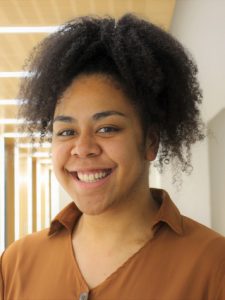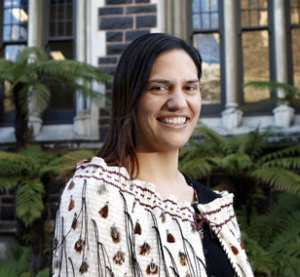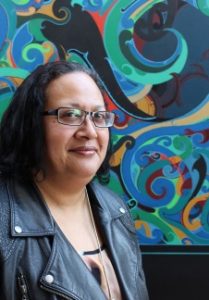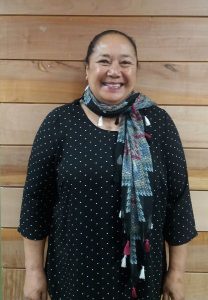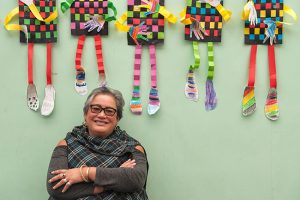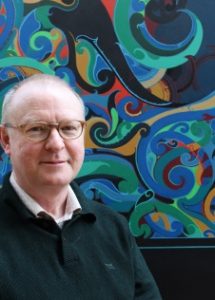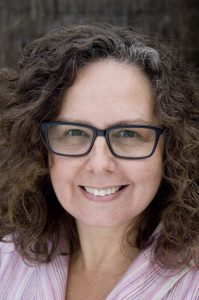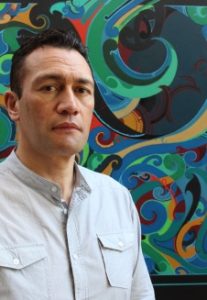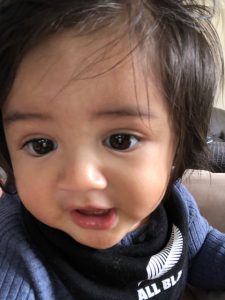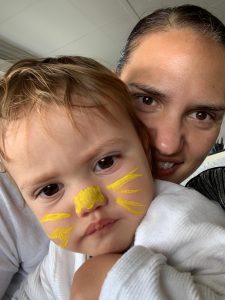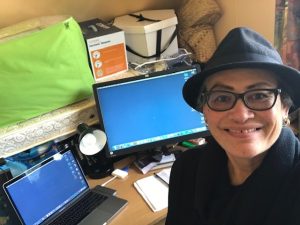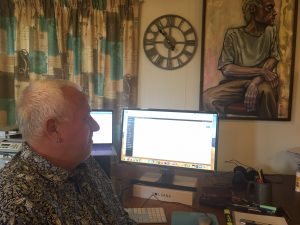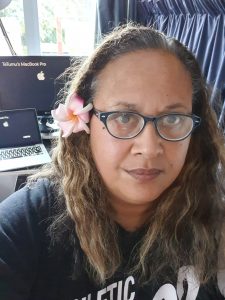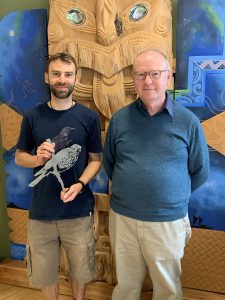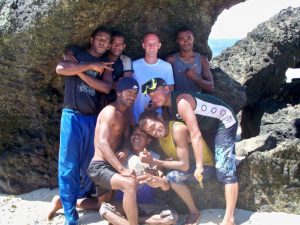Dunedin Cook Islands Research
It’s always great when undergraduate students get an opportunity to undertake research. This summer, Dr Emma Powell of Indigenous Studies had two young students helping with her look at the history and experiences of Cook Islanders in Dunedin as part of the ‘Akapapa’anga nо̄ te iti tangata project.
The following is an account from one of the students, Tiare Makanesi.
At the beginning of 2022, Emma Samuels and I had the privilege of working alongside Emma Powell on ‘Akapapa’anga nо̄ te iti tangata: Stories from the Cook Islands Community in Dunedin. With this project, we learnt more about the Cook Islands community in Dunedin and the journeys of our community from the Cook Islands to New Zealand. From finding Cook Islands dance troupes in the early 60s to learning about the Uki Tamariki Ou Cook Islands childcare centre that was set up in the early 2000s in Corstorphine, we gained a better understanding of our culture and how significant it is to the culture of Dunedin.

Anja Matapo, with the research students for the ‘Akapapa‘anga nō te iti tangata project, Emma Samuels and Tiare Makanesi.
We spent most of our time scouring through an array of archives to create a foundation of knowledge to prepare us for our on-going community work. The Hocken was our most used archive where, with past papers and microfilm, we discovered many stories that captured beautiful Cook Islands values and parts of our culture.
One article that I believe expresses the importance of our ui tupuna (ancestors) was an ODT piece from 1993. Emma’s pāpā (grandfather) was interviewed during a study about why the majority of rest home residents are European. Pāpā Puka attributed living with his children as a common tradition practised throughout Polynesia. This custom shows how we treasure and continue learning from their puna (springs) of knowledge. We look after them as they did us. This article reminded us of how important it is to respect and care for those that raised us.
Another article that we came across was about a community leader, Pāpā Kōpu Rouvi, and his involvement within the Dunedin Cook Islands community since 1966! Papa Kopu served the community when bringing Cook Islanders from the Islands to Dunedin, supporting those that needed advice. He became a role model that recently arrived Cook Islanders could confide in. This year was the second year anniversary of his passing and Emma and I organised a gift for his family on behalf of the Otago University Cook Islands Students’ Association. The support and guidance he gave University students over the years was irreplaceable and we wanted to show our appreciation.
Emma’s part in this project has included project managing the Cook Islands’ community’s (Te Vaka Cook Islands of Dunedin Inc.) oral history project, funded by the Ministry of Culture and Heritage. Her time has been spent upskilling and organising so that the community can complete this project to deadlines and to the standards expected by the funder. Thoughtful communication, the importance of a plan B and taking that extra step for refinement are all things Emma has learnt and put into practice. Emma said this project was more than just researching for her. It was a special insight into a community that she loved being a part of. She has focused on organising an oral history workshop for the community with oral historian, Helen Frizzell, and others at the National Library, and she created an adjusted budget and plan for the project following the award in late 2021.
For Emma and I, it has been an extremely rewarding experience to delve deep into the histories of our Cook Islands community here in Dunedin. Although we are Dunedin-born and raised, we hadn’t grown up involved in Cook Islands events. This project has helped us reconnect with our culture in so many ways. We now have a wealth of knowledge and a kete (basket) of ideas to continue enriching the community through the Otago Cook Islands Students’ Association. The difficulty of uncovering this knowledge also inspired us to amend our association’s constitution to donate to the ephemera collection at the Hocken Archives every year. This will be a growing legacy of our footprints as Cook Islands students here at Otago University.
Emma and I are thankful for this opportunity to dig through the archives as we never would have without encouragement. We were rewarded with evidence of sports teams, church functions and cultural programmes throughout the archive. Not only was I fortunate enough to learn about my cultural heritage but also my family’s history. I am now more aware of my language, culture and how my grandparents experienced life when they arrived here. That was my favourite part of this project. It has allowed us to build strong connections within the community which is important when finding our identity. It really has helped us discover what it truly means to be a Cook Islander here in Dunedin.
We have the deepest gratitude for Te Vaka and Emma Powell for putting their faith in us to execute this research. We have gained many skills and experiences during our work and appreciate the responsibility given to us. We would like to thank Te Tumu and the University of Otago for allowing us to take a break from our supermarket jobs and fully immerse ourselves in such a rewarding “job”.
Meitaki ma’ata,
Tiare Makanesi.
Looking for a new Dean
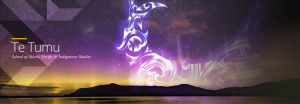 The university is advertising for a new Dean of Te Tumu, someone who is a great leader, researcher and person, with research and teaching aligning to Māori, Pacific, or Indigenous Studies (or a combination of these). CLICK HERE FOR LISTING.
The university is advertising for a new Dean of Te Tumu, someone who is a great leader, researcher and person, with research and teaching aligning to Māori, Pacific, or Indigenous Studies (or a combination of these). CLICK HERE FOR LISTING.
Please share this to your networks, and to anyone who you feel might be the right person for the job. Te Tumu is an exciting, dynamic school, at the best university in New Zealand.
MIndS students’ success
It’s graduation this coming Saturday (21 Aug), and Te Tumu is lucky to have three Master of Indigenous Studies students who are graduating. This is always a wonderful occasion for graduates themselves, as well as their families and their supervisors.
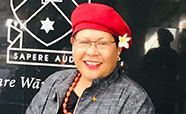 Tofilau Nina Kirifi-Alai (Sāmoa) was until recently the Manager of the University of Otago’s Pacific Islands Centre. She is currently the Inaugural Manager of Pacific Community Engagement, University of Otago, based in Auckland. This is a new role that the University of Otago established this year.
Tofilau Nina Kirifi-Alai (Sāmoa) was until recently the Manager of the University of Otago’s Pacific Islands Centre. She is currently the Inaugural Manager of Pacific Community Engagement, University of Otago, based in Auckland. This is a new role that the University of Otago established this year.
Research Title: “The Development of the Pacific Islands Centre at the University of Otago, Dunedin, New Zealand: A Personal Reflection”.
Supervisor: Telesia Kalavite
Abstract: “The purpose of a Centre for Pacific students is to seek and find ways whereby meanings, nuances and metaphors in Pacific cultures can speak to the heart, the soul and the mind of the students. The challenge here, as in other places, lies in how to articulate speech and writing to get meanings, nuances and metaphors of Pacific cultures within a monocultural academic environment” (Comment by His Highness Tui Atua Tupua Tamasese Ta‘isi Efi‘s inauguration speech at the formal opening of the Pacific Islands Centre, University of Otago, in 2003).
The establishment of the Pacific Islands Centre (PIC) in 2001 was a response by the University of Otago (UO) to the Tertiary Education Commission (TEC) initiatives to ensure the success of its Pacific students. Pacific Islands people’s participation in New Zealand society, including education, is still lagging behind that of the general population since the late 1960s. The PIC was the first-ever centre within New Zealand Tertiary Education Organisations (TEOs) and this year, 2021, marks its 20th anniversary. The PIC creates pathways for students’ success at the UO reflecting the government’s continuous attempt to improve the success rate of Pacific peoples in the education system. The PIC strongly becomes the impetus to lead and implement support for Pacific students and staff through its engagement with the UO and Pacific communities locally, nationally, regionally and internationally.
This research takes an autoethnographic Pacific approach. Autoethnographic because it documents my reflections as the inaugural Manager of the PIC since 2002; Pacific because it is a Pacific-focused centre, operated by Pacific staff for Pacific students and, most importantly, I, the researcher am Samoan, and of Pacific decent. My voice becomes central in documenting the Centre’s developmental history because when I first started as the pioneer of the PIC there was no specific Pacific model to build on, or strategic framework or manual to guide it. This research therefore, is basically grounded on Pacific philosophies of attitudes, views, ideas, values, beliefs, customs, traditions, practices and experiences of the researcher.
The PIC is significant for the educational development of Pacific students and staff at the UO. This research documents the journey of the PIC in terms of its history, developmental strategic plans, practices and reviews that enhance the success of everyone involved. This research is unique and authentic in its approach as it provides first-hand information on how the PIC nurtures Pacific Islands students in their academic journeys. It also adds value to the development of educational strategic directions of the UO to benefit both Pacific and non-Pacific communities at Otago, New Zealand, the Pacific region, and the world.
The first generation consists of the maternal and paternal grandparents of the author, in which they discuss vasu in its political definition of ‘half-caste’ or of mixed ethnic heritage. This generation will also elaborate on contributing themes to vasu, such as their relationships with their kinship groups, languages/dialects and their Fijian identity. As this generation is the only group to have regular visits and contact with their rural villages, vasu will be viewed through this lens.
The next generation is of the author’s parents and they will also discuss themes such as their own Fijian identity, as well as the role of Fijian women, domestic workers and accessibility to the village. This particular generation is part of the urban migration and will reflect over vasu with this viewpoint.
Finally, the last generation is of the author’s and her maternal and paternal first-cousins. The supporting themes for this generation’s understanding of vasu are customary Fijian relationships and concepts, mixed ethnicity and the use of Fijian language and knowledge. This generation is a part of the Fijian diaspora in New Zealand and will be using this perspective in sharing their understandings and experiences of vasu. Eventually, similar elements and concepts will be highlighted, with each generation sharing their own narratives on what vasu is to them. Despite the different time periods and physical contexts, the prominence of the maternal lineage has proven to play a significant role in every generation of this family, particularly in a patriarchal society that is known to Fiji.
 Nicola (Nicky) Andrews (Ngāti Pāoa) Nicky is currently a faculty librarian at the University of San Francisco where she teaches undergraduates how to do research; and work on other projects including research into Indigenous information literacy. She is open to pursuing a PhD in the future.
Nicola (Nicky) Andrews (Ngāti Pāoa) Nicky is currently a faculty librarian at the University of San Francisco where she teaches undergraduates how to do research; and work on other projects including research into Indigenous information literacy. She is open to pursuing a PhD in the future.
Nicky was initially supervised by the late Alumita Durutalo. Paerau Warbrick took over during the research design and interview phase, and Erica Newman supervised her work during the bulk of the writing and revising phase. Nicky is thankful to all three for their work and care. She will graduate in absentia.
Research title: “Historical Trauma, Indigenous People, and Libraries.”
Abstract: Historical trauma theory (HTT) built on understanding of Holocaust survivors and subsequent generations (Pihama et. al., 2014) and articulated how colonization and genocide against Indigenous peoples also resulted in historical trauma and intergenerational grief (Brave Heart & DeBruyn, 1998; Methot, 2019). In this research report, I examine how modern libraries reinforce historical trauma for Indigenous library users and workers through library origins, professional credentialing, staffing demographics, and policies. While historical trauma theory is rooted in social work (Brave Heart & DeBruyn, 1998), it is applicable to librarianship as a profession of public service that impacts Indigenous access to knowledge and self-discovery.
I conducted my research using kaupapa Māori and autoethnography frameworks, to interview five Indigenous librarians from Aotearoa, Canada, and the United States. Over Zoom, participants detailed their unique experiences as Indigenous people using libraries, studying library science, and working in libraries.
Participants spoke candidly about the racism and microaggressions they routinely encounter; and the isolating nature of often being the only Indigenous worker in their team or place of employment. In particular, participants recounted how historical trauma resurfaced when facing inadequate resources to support Indigenous knowledge, or when organizations reinforced policies that conflicted with Indigenous practices and worldviews.
However, participants also described hope and progress towards equity, aligning with contemporary shifts toward valuing Indigenous peoples in libraries. I make and acknowledge several recommendations in this report ranging from practical changes to library policies and practices, to frameworks to address historical trauma within library spaces. These practices can be applied beyond libraries into higher education, government work, and other sectors.
This Reseach can be accessed through OUR Archive.
Te Tumu would also like to congratulate Pipi Royal who will be graduating with their BA in Māori Studies.
Dr Kalavite features on two international panels
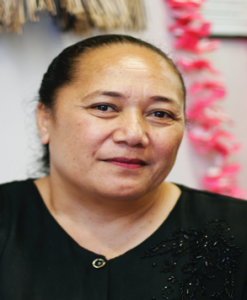 Recently Dr Telesia Kalavite was invited to participate in two online international panel discussions on the 4th, and 5th of August,
Recently Dr Telesia Kalavite was invited to participate in two online international panel discussions on the 4th, and 5th of August,
She was first invited by Fola-he Ngalu Online Media Network, a Free Weslyan Church of Tonga (Siasi Uesiliana Tau‘atāina ‘o Tonga) online platform, to discuss the topic: “The advice for parents of internet generations to help them understand what it means for their children to be proud of their Tongan identity within and outside of Tonga”. (“Ko e fale‘i, ke tokoni ki he mātu‘a ‘o e to‘utangata Tonga ko eni ‘o e Ope pē ‘Initaneti, kenau ongo‘i ‘oku mahu‘inga kenau ke i pōlepole pē ‘i honau Tonga, ‘o tatau pē ‘i Tonga pea mo muli, (‘I loto-Tonga mo tu‘a-Tonga)”.
Her focus in this panel was on her perspective as a Tongan mother and educator on what it means for this internet generation to be rooted in their Tongan culture. “Pe koehā ‘ene vakai ki he mahu‘inga ‘a hotau ‘ulungaanga faka-Tonga ‘i Tonga (loto-Tonga), ‘i he kuonga pē to‘utangata ko eni ‘o e ‘Initaneti/Vahaope” This panel was mostly in the Tongan language and can be found on the Network’s website, on Youtube, and Facebook.
Telesia was also invited by THE (Times Higher Education) Live ANZ 2021 International Conference, to be one of the panelists on the topic: “Indigenous Knowledge and the Western academy: Reflections from the field”.
Her focus in this panel was on her research, knowledge and experience on Pacific success in New Zealand Higher Education. Click here for the link to this panel.
Dr Kalavite is the Coordinator for Te Tumu’s Pacific Islands Studies programme. It is wonderful to see Te Tumu staff sharing their knowledge to wider audiences, and helping to meet the goals of the university’s Pacific Strategic Framework.
Michelle Schaaf offers commentary on Dawn Raids apology
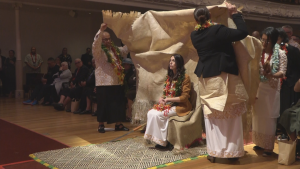 It is great when Te Tumu academics are called upon to comment on important national events as they happen. Yesterday the Prime Minister made an formal apology for the dawn raids of the 1970s when Pasifika people were indiscriminately targeted by the police and officials as “overstayers”. The PM also took part in an ifoga ceremony to assist with healing these traumatic events. Click here for the full One News account, with extensive commentary from Pacific Islands Studies lecturer, Dr. Michelle Schaaf.
It is great when Te Tumu academics are called upon to comment on important national events as they happen. Yesterday the Prime Minister made an formal apology for the dawn raids of the 1970s when Pasifika people were indiscriminately targeted by the police and officials as “overstayers”. The PM also took part in an ifoga ceremony to assist with healing these traumatic events. Click here for the full One News account, with extensive commentary from Pacific Islands Studies lecturer, Dr. Michelle Schaaf.
2020 Te Tumu Research Round-up
Well, it’s been a weird year for everyone, and the coronavirus certainly made our work harder, with a lot of our energy going into making sure we were able to still offer quality teaching to our students. We have also had a number of staff move on to greener pastures: Jim Williams and Lyn Carter retired; Gianna Leoni left us to take up a research role with Te Hiku (where former colleague Suzanne Duncan also works); Megan Pōtiki has shifted to the Office of Māori Development in the university; and Poia Rewi has taken up the Tumu Whakarae (CEO) position at Te Mātāwai. So we are expecting to see a bunch of fresh faces in the new year.
Research has still carried on. As the Chair of our Research Committee, Michelle Schaaf says, “Despite Covid, the retirement and departure of staff; the research committee’s commitment to building a successful research culture continues and owes its success to the oversight and guidance provided by senior staff directly. The committee continues to monitor staff research activity and promotes staff research through various mediums: research website long running and informative Research Blog.”
We also asked staff to tell us about their research, and what they’ve been up to. Here are their replies.
Karyn Paringatai’s Marsden
Karyn is lead investigator on the Marsden project: E kore au e ngaro! The enduring legacy of whakapapa (awarded $823,000), which looks at the importance of whakapapa in health, in particular to whānau that carry the cancer-causing hereditary mutation in the CDH1 gene.
2020 started with good intentions to advance my Marsden research with a lot of face-to-face engagement sessions planned, but those plans fizzled quickly during the March-April lockdown. But things have picked up during the second half of the year with a lot of gusto. In September I met with Maybelle McLeod, Pauline Harawira and Erin Gardiner from Kimihauora Health and Research Centre in Tauranga to co-develop a research topic for future PhD student, Kahurangi Salu. Pauline and Maybelle were two of the four lead investigators of the research project that discovered the CDH1 gene mutation. A conversation with Pauline went as follows:
Pauline: “My mother was from Hicks Bay.”
Me: “Oh wow.”
Pauline: “Yeah her younger brother, we called him Uncle Boy, his first name was Manuhou. His middle name was Paringatai. He was named after that koroua that died in the war.”
FUN FACT: My whānau are based just over the hill from Hick’s Bay. My daughter is called Manuhou Paringatai. She was named after that same koroua who died in the war, my grandfather’s first cousin. Whakawhanaungatanga – well and truly achieved.
Check out this short video featuring Karyn and the wider project.
This meeting coincided with a wider whānau hui. It was an opportunity to speak to whānau, canvas opinions, make connections, and recruit participants. The concerns they expressed were echoed in my research objectives. As a result I have been involved in developing a post-surgery nutrition research project and a funding proposal for a Kaihautū – someone who will help develop a pre- and post-surgery management care plan that takes in to account Māori realities. Watch this space……
Michelle Schaaf’s research
The Covid pandemic really pushed me to think of what the different ways are, that I could have students demonstrate what they know. There’s been a lot of me letting go of control, to try and build resilient and more-independent students. Teaching remotely also made me look at my own course content with fresh eyes. In terms of my research, I was forced to be adaptable, and implement strategies to mitigate the long-term impact of research disruptions.
new Publications
UORG: “Childhood in a changing Pacific”
Freeman, R.M. Schaff, C. Ergler, M. Kivalu, A. Niusulu, T. Tua’a and H. Tanielu, Childhood in Changing Pacific’ Summary Research Report August 2020, (Summary Research Report), Dunedin: School of Geography, University of Otago.
Childhood in Changing Pacific’ Summary Research Report Presentation and Exhibition. 10 November 2020. This was a report presentation to participants and their families, in Dunedin and Samoa, on campus and via zoom platform. See here for more.
Articles submitted
“Kinship and belonging: Pacific children’s perspectives on the diaspora” to the Childhood Journal.
“Connections to community and culture, a photographic analysis of place attachment amongst Pacific Island children” submitted to Children’s Geographies.
Telesia Kalavite’s latest article
Telesia has recently published an article, “Toungāue cooperative pedagogy for Tongan tertiary students’ success” in the Waikato Journal of Education, 25, 1 (2020). You can read it here.Toungāue cooperative pedagogy
Abstract
Cooperative Pedagogy specific to Tongans can enhance students’ academic success in New Zealand’s tertiary education. Tongan students’ success depends on teachers’ recognition and understanding of Tongan students’ sociocultural context which involves their pule‘anga (bureaucracy), famili/kāinga (family), siasi (church) and fonua (country) relationships. Tongan students should not be treated within the Pacific groupings because ‘Pacific’ is a term of convenience for peoples who originate from different countries in the Pacific region whose cultures are uniquely different from one another. The term ‘Pacific’ tends to make these students live in the shadow of being treated as if they have the same needs in the classroom. The culturally specific needs of Pacific students are obscured by the assumption that they are homogenous. Academics and educational authorities in New Zealand need to recognise the importance of Pacific students’ culturally specific needs in their educational environments to move towards solving the problems of underachievement. This article explores the use of a culturally specific Tongan Toungāue Cooperative Pedagogy for teaching Tongan students in New Zealand tertiary education. Toungāue Cooperative Pedagogy is rooted in Tongan students’ sociocultural context which is at the heart of the Tongan society. More importantly, this proposed Toungāue Cooperative Pedagogy is transferable and could also be beneficial to other Pacific and Indigenous cultures.
Keywords
Toungāue cooperative pedagogy; Tonga tertiary students’ success; Pacific diversity; Pacific ethnic special needs.
Tangiwai Rewi’s projects.
Most of the research related mahi I have been consumed by since 1 July has involved the 0.2 FTE Ngā Pae o Te Māramatanga co-management of the Te Pāpanga Te Reo Māori, Ngā Tikanga Māori (TRMNTM) mahi along with Dr Gianna Leoni with the departure of Professor Poia Rewi. The list includes:
- Running a Te Kōrerorero a Ngā Tumu Whakarae webinar hosted on the last day of Māori Language week 18 September 2020 to encourage eight CEO’s to share their ideas about working together for te reo Māori research under Te Papa Kōrero. The purpose of Te Papa Kōrero is to provide coordination and leadership for the implementation of both Maihi (Maihi Māori and Maihi Karauna) in respect of the Māori language strategy. We managed a 50% success rate by confirming Shane Taurima (Māori Television), Larry Parr (Te Māngai Pāho), Dr Poia Rewi (Te Mātāwai) and Ngahiwi Apanui (Te Taurawhiri) to participate in the session facilitated by Dr Gianna Leoni and myself (from Te Tumu at the University of Otago), in our roles as the NPM Co-Managers of Te Reo & Ngā Tikanga Māori Platform. We aim to invite the other four Chief Executives of Te Puni Kōkiri; the Ministry of Education; the Ministry for Culture and Heritage and the Department of Internal Affairs, who were unavailable on this occasion, to join another webinar at a later date.
- N03 Project Te Reo me ngā Tikanga Māori – Named Scholarship – Professor Wharehuia Milroy; Understanding, articulating and measuring the language shift at the micro-level As part of the Ngā Pae o te Maramatanga Summer Internship Projects 2020-21 we were asked to develop, organise and then manage and supervise this named scholarship to recognise the scholarship and leadership of the late Te Wharehuia Milroy to the revitalisation and normalisation te reo me ngā tikanga Māori. In doing so, the intern will review and develop an understanding of Milroy’s research and scholarship, that is specific to te reo Māori normalisation and excellence. Dr Gianna Leoni will be the NPM Investigator who will work alongside Ria Tomoana (Kaiwhakahaere Rangahau – Te Mātāwai) to supervise the student.
- The third project we have been doing is our Collectivising Ngā Pae o Te Māramatanga Publications which we presented on at the 9th Biennial International Indigenous Ngā Pae o te Maramatanga (NPOTM) conference online 18-20 November. In three phases, the first produced punchy, attention grabbing abstracts summarising the articles.The second attributes keywords to the articles along with word clouds. To ensure accessibility after these two phases, the third phase thematicises the lists so that any person wanting to know what articles are published in each issue can search via content themes. Phase 1 comes to an end this year while phases 2 and 3 will look at completion by end of April 2021.
On a personal research note:
- I continue to push through with my Tuupuna Times research project holding wānanga for whānau and hapū on request, on how to collect stories from their tuupuna.
- My research plan for RSL is a little off beam given the attention to the Ngā Pae o Te Māramatanga workload. However, the next two months will be busy getting that back on track, assisted gratefully by the Te Koronga continued funding support of $5000 development grant this year and recent success with my UORG application He Whakapakari Ake i Te Tuakiri Maaori of $11, 434 which takes effect 1 January 2021.
- I contributed a Māori perspective to a paper, Ko tā te Māori aronga ki te whakamātao kikiri. A Māori perspective on embryo cryopreservation, which is currently being reviewed by the lead author.
- I still have two articles to complete by the start of next year!
That’s it!
What is Michael Reilly doing?
Since 2019 I have off and on been working on a Māori tribal history manuscript. It currently is organised around the chief themes of tribal traditions: creation, culture heroes, the waka migrations, and the stories about the many generations of descendants who settled and populated this new country. The latter extends over a wide range of topics such as rangatiratanga or leadership; mana wāhine, mana tāne or gender relationships; and possibly, the place of emotion words such as whakamā, or shame, and pōuri, or grief. Each chapter is organised around a selection of traditions on the topic from different iwi. Attention is paid to southern traditions where possible. These traditions are normally taken from published sources, often collections of traditions with a limited analysis or explanation of the content of the narratives.
My aim is to provide the cultural context of these stories in order to help the modern reader understand the layers of meaning found within each text. This often involves an immersion in older ethnographic works by the likes of Elsdon Best, Te Rangihīroa and Raymond Firth who put on record information shared with them by generations of Māori scholars. By locating the texts within this ethnographic record, I can better peel back the layers of meaning found in each of the stories. To me, it opens a window upon that ancient world of the ancestors, Te Ao Kōhatu, the Stone World, as Bruce Biggs once described it. This approach resembles the kind of work I have been pursuing for some years, both in Aotearoa and in the wider world of Ancient East Polynesia, notably Mangaia.
Behind this approach lies an influential model: Erich Auerbach’s Mimesis: The Representation of Reality in Western Literature. He began writing it while in exile as a German Jew teaching in Turkey during the Second World War. Each of his chapters selects a passage from an author, from Homer through to Virginia Woolf. He uses each of them to explore ideas about how Western literature has sought to represent the world. His aims differ from mine but some of his methods have encouraged me to try and explore the totality of Māori traditions from its beginnings in time down perhaps as far as the edgy beginnings of modern Aotearoa, ending however, in the early nineteenth century when Māori understandings of their world remained dominant. For it is their story after all I am interested in.
More recently, I have initiated other smaller projects after approaches to provide publications either for edited books or journals. One looks at emotions in Oceania, drawing on selected texts from particular Island societies, including Mangaia and Aotearoa, that illustrate important concepts such as love, shame and grief. I am also interested in comparing the different words used to describe the human organ or centre of emotions, such as ngākau and manawa.
Currently, with the help of a research assistant, Jade Higgan McCaughan, I am examining evidence found in the songs published in the four volumes of Ngā Mōteatea, edited by Apirana Ngata and other scholars. Another project was prompted by plans to celebrate the coming of the London Missionary Society to the Cook Islands. I decided to look at some letters by a 19th century Mangaian church minister, Mamae. In one he describes his experience of a hurricane, while in others he gently criticises the editing of local texts by his colleague, William Wyatt Gill; an interesting case of the native speaking back. We see Mamae as a skilled writer who is actively participating not only in the recording of traditions, but also in how it is presented in published form. These kinds of letters give a window into the work and contributions of an important early scholar and missionary whose name, however, is far less well known that Gill’s, for it is the latter’s name that appears on the title pages of the ethnographic studies these two men collaborated in producing.
All this work takes place in the small intervals of relative calm permitted to me when I am not busy either teaching or discharging the responsibilities of Acting Dean of Te Tumu, a role bequeathed to me by Poia Rewi on his departure for Te Mātāwai in Te Whanganui-a-Tara.
Erica Newman’s exciting new project
Erica is lead investigator in a new fast-start Marsden project beginning in 2021: Journey Home: Descendants of Maori adoptees search for their turangawaewae. Only researchers who have recently completed their PhDs are eligible to apply for a Fast Start Marsden grants.
This research will investigate the ripple effects of the 1955 Adoption Act from which some Māori adoptees grow up not knowing their whakapapa, and look at the journeys that some of their descendants undertake in the search for their tūrangawaewae. Erica’s project has already attracted quite a bit of media attention, on te aka kumara, and waatea news, which is useful for getting the project out there to the descendants who may want to make contact with Erica. There is also a closed Facebook page just started, “Descendants of Māori Adoptees”, a safe space for these descendants to ask questions, share stories and support each other.
Erica was also asked to come on the team of the Marsden-funded project, Te Hau Kāinga: Histories and Legacies of the Māori Home Front, 1939-45, to contribute research on tikanga, whānau and adoption
Erica teaches in some large classes, and says that she found challenging converting on-campus papers to on-line. “This year has been quite draining with covid, and the future is a little unsettling when thinking about teaching, not knowing whether we will (or won’t) go into more lockdowns next semester.” But she is keenly looking forward to getting into her research.
Dr Paerau Warbrick’s goings on
In terms of research this year, I have been beavering away at articles.
Recently I have had an article accepted by the Australia & New Zealand Law & History journal, which will be published later in 2021. It is on Māori and Citizenship. And it takes a look at what this phrase ‘citizenship’ meant for Māori up until the 1950s.
My research is taking on a distinctly historical political flavour, on the heels of my 2019 article in the New Zealand Journal of History about Māori elections in the nineteenth century.
I have finished a chapter for a book edited by Lachy Paterson, myself and Megan Pōtiki on Māori texts, contexts, and their resonances for today. This chapter looked at Hēnare Tomoana, MP for Eastern Māori 1879-1884, and his pivotal role in the fall of George Grey’s Government in 1879.
Recently I submitted an article to the Journal of New Zealand Studies. It looks at the two Māori Election Petitions that try to unseat the MPs Karaitiana Takamoana (Eastern Māori) in 1876 and Hone Mohi Tāwhai (Northern Māori) in 1879. In order to understand these petitions, you really have to come to grips with the complex wider political machinations of the Fox, Vogel and Donald McLean political blocs, and the George Grey and John Hall group of MPs in Parliament.
Currently, I am working on an article for the Journal of Polynesian Society on the monumental election battles between Wi Pere and James Carroll over the Eastern Māori seat between 1884-1890. It is an attempt at historical psephology where I use fragmented polling booth data to uncover complexities in the Māori communities in the Eastern Māori election. I am looking at submitting this to the journal by mid-December 2020 or more realistically late January 2021.
This past year has definitely been a challenge for everyone. I wish everyone a safe and reflective Christmas and New Years. Mauri ora koutou.
Lachy Paterson’s doings
Lachy is lead investigator, with Angela Wanhalla (History) on the Marsden-funded project: Te Hau Kāinga: Histories and Legacies of the Māori Home Front, 1939-45, looking at what life was like for Māori in New Zealand during the Second World War, and how these experiences shaped Māori society in the years following the war. He is currently on RSL.
This project incorporates a large team. Alongside Angela Wanhalla and I, we have Erica Newman (as discussed above) as research associate, and five research assistants (one of whom is based in Wellington, and another in Auckland). We’ve also two excellent student researchers, Hannah Barlow and Stacey Fraser, both history post-graduates with research aligning with our project. It’s also been wonderful to be able to fund Māori summer scholarship students, with three who undertook projects last summer. Due to the travel restrictions, we have been unable to go to several overseas conferences, so redirected some of those funds into more summer scholarships. This summer we have six young Māori students (two partially funded through the Humanities Māori Summer Bursaries) who have just started their projects.
A key tool for our project is the Te Hau Kāinga website, which is fully bilingual. The site features a Stories page where we are posting research as we go along. It’s a bit eclectic, but definitely worth a read. The stories are also circulated to Facebook pages: our own FB page @maorihiomefront, the NZ History Teachers page, and the Māori-language versions onto the Te Mana o te Reo Maori page.
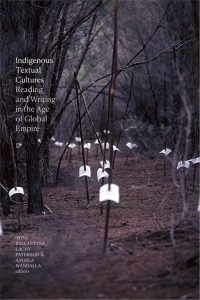 I have been fortunate to see a couple of publications appear this year. Indigenous Textual Cultures: Reading and Writing in the Age of Global Empire was recently published with Duke University Press, 2020. This project came out of a 2014 symposium in Dunedin featuring a number of eminent international scholars, and Tony Ballanyne, Angela Wanhalla and I co-edited the collection of essays that came out of the symposium.
I have been fortunate to see a couple of publications appear this year. Indigenous Textual Cultures: Reading and Writing in the Age of Global Empire was recently published with Duke University Press, 2020. This project came out of a 2014 symposium in Dunedin featuring a number of eminent international scholars, and Tony Ballanyne, Angela Wanhalla and I co-edited the collection of essays that came out of the symposium.
Sometimes things take time. I attended a symposium on colonial newspapers at Yale University in 2017, looking at the notion of Habermas’s “public sphere” within colonial societies, presenting on Wellington Māori letters in Te Karere o Poneke in the 1850s. This was recently published as “Te Karere o Poneke: Creating an Indigenous Discursive Space?” in “Special Issue: Colonial Public Spheres and the Worlds of Print”, Itinerario: Journal of Imperial and Global Interactions,44, 2 (2020) edited by Emma Hunter and Leslie James.
My argument is that if you used the conditions of the Habermasian model of a public sphere (a rather Eurocentric theory) it was difficult to apply to Māori of the Wellington period in the 1850s. They were not urban, bourgeois, or anti-clerical, nor in control of the media. But the impact of colonialism nevertheless gave them new ways of looking at the world, and that this newspaper gave plenty of scope for them to articulate them.
I have also submitted a chapter, “Race and Revolution: Haiti and the Kīngitanga, 1863” for a new book, edited by Lyndall Ryan and Angela Wanhalla, on Aftermaths: Remembering Colonial Violence in New Zealand, Australia and the Pacific. This should appear with Otago University Press in 2021. I was also asked to contribute a case study for the planned Edinburgh Companion to British Colonial Periodicals, and have written (but not yet submitted) a piece entitled, “Making Māori citizens in Colonial New Zealand: the Role of Government Niupepa.” I anticipate this coming out in 2022 with Edinburgh University Press.
Another project is to write a book on Māori print culture, from the first book in 1815 through to the present. I have pretty much written a draft, but this needs some extra work and refinement. And as Paerau mentioned above, he, Megan Pōtiki and I have a planned edited collection on Māori-language texts that we plan to get on to when we have a spare breath.
Te Tumu Research Under Lockdown
The Lockdown has proved hugely disruptive to all Te Tumu staff, impacting on all aspects of our academic lives, including research. We now move from Lockdown to Level 3 – which so far doesn’t look too much different for us. Despite this, we have still been managing to keep our research productivity going, hopefully with some “outputs” in the offing.
To find out a little bit more, I sent out a request to staff to send in a few details on the highs and lows of their research during lockdown.
First, let’s talk about some of the problems. Some staff talked of getting “zui’d out”, i.e. too many Zoom hui. There’s been some research on how tiring Zoom meetings can be, and what with teaching online, staff and school meetings, supervision get-togethers, and other hui, it can seem like some days we are constantly on Zoom. Then there’s the extra effort preparing for online teaching, especially in the reo classes where you need to convert the quick-flowing quick-changing interactive tasks into online teaching activities.
Then there are the events that have been cancelled or deferred, such as Poia Rewi’s Māori language symposium that he had planned with the Government Department Collective, and Michelle Schaaf’s planned delivery of Summary Report for ‘Childhood in a Changing Pacific’: Samoa and Dunedin to Pacific communities in Samoa and Dunedin. Lachy Paterson had also been planning to kick off his upcoming research and Study Leave (RSL)with a couple of conferences in France, but these have both been cancelled.
Then there’s working from home. Three of our staff have young children also locked down with them, which creates its own complications. As Karyn says, she has also been “researching meal plans for a fussy eater and activities to keep a 13 month old entertained” – hard work when “food still refuses to get eaten and suggested activities don’t keep her attention for longer than 5 minutes!!” And one person complained (was it a complaint?) that “My new office space is far too close to the pantry”.
So if those were the lows, what were the highs?
Poia says he is pleased that Gianna Leoni and Tangiwai Rewi have come on board the Te Reo Me Ngā Tikanga Māori Platform for 2020 research, looking at the impacts of research by researchers under Ngā Pae o te Māramatanga. Gianna is also feeling chuffed that she has finished a research proposal she had been needing to do for a few months – and having it accepted.
Tangiwai, as Chair of the Te Tumu Research Committee, also organised a “Hot Tips” Zoom session with staff earlier this month, on how to enhance their applications for University of Otago Research Grants (UORGs). We were really pleased to have the ebullient Humanities Associate Dean (Research), James Maclaurin there to share his knowledge with us.
Both Lachy and Tangiwai are on RSL next semester, so have been revising their travel, and research and writing plans, which has been difficult given that no one knows how long we will be in Level 3, or when normality will return.
Lachy has been organising getting the proofs and indexing for a new edited collection on Indigneous textual cultures, which will hopefully be out in September. See here for more info. He been working on the Te Hau Kāinga/Māori Home Front project, including translating the blog posts. If you haven’t read the latest ones (in English or Māori) then check them out at the project website. You can also listen to him and Angela Wanhalla promoting the project on Radio New Zealand’s Saturday Morning programme on Anzac Day: Lachy has also been asked to submit an abstract for a chapter on Māori newspapers in The Edinburgh Companion to British Colonial Periodicals.
Michelle has been busy transcribing interviews, sorting participants’ diaries and personal papers collected during her recent RSL, in preparation for UORG application. She is also part of a team who have just completed the Summary Report for Childhood in a Changing Pacific: Samoa and Dunedin. She has also been chosen to write a chapter for an e-book for Bridget Williams Books on “’Thesis Survivor Stories”, to be published in June.
Megan Pōtiki is busy on finishing her thesis. She recently published “Te hū o Moho: The call of the extinct Moho: The death of the Māori language at Ōtākou” which appeared in the latest issue of Te Pouhere Kōrero.
Lyn Carter has completed a journal article during the Lockdown, which she has sent off to a Sami journal. Otherwise, she says, she has been having lots of Zoom meetings with various research clusters around climate change and health/climate change and environment, including on her National Science Challenge projects, Building Better Homes, Towns and Cities, and BioHeritage.
Building on her publishing success from last year, Telesia Kalavite, is currently writing a journal article for the New Zealand Journal of Educational Studies. She is also one of the principal applicants for a successful grant application for Humanities Research Network with an amount of $10,000 for 2 years. The name of the project is: “Pacific Thought Network (PacTNetwork)”. Telesia is now developing an application for UORG grant to further her research.
Our newest staff member, Vaivaimalemalo Michael Ligaliga, has been very busy. He has been developing a book proposal for Palgrave Macmillan based on his PhD thesis, as well as a UORG application. Michael has also been working on a chapter on the Samoan perspective on addressing domestic or family violence for the Handbook of Positive Peace , and another for Decolonizing Indigenous Research Methodologies in Peace and Conflict Research.
Michael Reilly has been continuing his work, writing chapters about Māui Pōtiki, one on a Ruapuke Island narrative, and another looking at two stories by Mohi Ruatapu. His aim is to incorporate these chapters into a book about Maori tribal traditions, perhaps with Auckland University Press, building on the kind of topics he has taught in his MAOR207 and INDV307. Michael has also been asked to contribute a chapter on emotions in the Pacific and Australia for an edited book, The Routledge Modern History of Emotions.
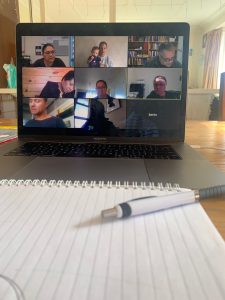
Perpetual hui on Zoom! Here Karyn and Manuhou are attending a board meeting for Te Rūnanga Māori of Ako Aotearoa.
The Lockdown has disrupted Karyn’s Marsden research, so she’s been busy working on a new plan, and catching up on some of her reading. She has recently been published by Lancet Oncology. This came from an invitation to her and her collaborators to the International Gastric Cancer Linkage Consortium in Wānaka last year to share their research on updating the international practice guidelines for Hereditary Diffuse Gastric Cancer. Karyn is currently working on the final draft of a book chapter she is co-writing with Marcelle Wharerau (ex-Te Tumu student, now teaching at Waikato University) on subversive pedagogies entitled, “Tūngia ki te marae, tau ana – culturally transformative learning in universities”.
Paerau Warbrick was enjoying his RSL when the Lockdown was imposed, focusing his research on historic Māori elections, and the lawsuits that often went with them. He has just finished a draft article on the 1876 Eastern Maori election petition involving Hēnare Pōtae, Rōpata Wahawaha and Karaitaina Takamoana and the 1887 Northern Maori election petition involving Hirini Taiwhanga and Wī Kātene. Paerau is also working on an article on the monumental election battles between Wī Pere and James Carroll in the 1884, 1887 and 1890 elections, and making the finishing touches to another article regarding the UK Supreme Court and how it should take lessons from the NZ Court of Appeal Maori Council case of 1987 and the Foreshore and Seabed case of 2003.
Wherever you are, I hope you are all staying safe and keeping well, and being productive with your research (if that’s your thing).
PhD Celebration
When possible, Te Tumu always likes to acknowledge our students’ completions of their PhDs with a morning or afternoon tea. Today was our opportunity to celebrate Raphael Richter-Gravier, who graduated last December. Given that his thesis investigated Polynesian bird narratives, it was fitting that Te Tumu gifted Raphael with a 2-dimensional metallic sculpture of a kārearea (NZ falcon). His supervisor, Professor Michael Reilly, spoke about what a wonderful doctoral student Raphael was, one whose writing was stimulating and thoughtful, and didn’t need too much revising. Raphael also noted that his friend, Manu Berry has created a number of woodcuts inspired by the bird narratives, which are currently on exhibition at PC Gallery in Port Chalmers. Raphael has been with Te Tumu for a number of years, as a student and tutor in Māori Studies. He seems to have a lot of activities on his plate at present (including teaching French), and we wish him well for the future.
Neigbourly success, on a Pacific theme.
Earlier this year, due to move logistics within the Humanities Division, some Te Tumu staff had to shift rooms. This led to our Pacific Island Studies team sharing the fourth floor with academics from the Religious Studies programme. Te Tumu would like to congratulate one of our new neighbours, Dr John Shaver, for winning a Marsden Grant to undertake further research on religious practice in Fiji.
Click here to find out more about his project, “Investigating the impact of religion on cooperation and inequality in Fiji”. We look forward to finding out more as his project progresses.
Manu narratives of Polynesia
Te Tumu would like to congratulate Raphael Richter-Gravier, one of our stellar postgraduate students, for having completed all the post-examination formalities for his PhD on “Manu narratives of Polynesia: a comparative study of birds in 300 traditional Polynesian stories“.
Raphael was supervised by Professor Michael Reilly and Dr Michelle Schaaf from Te Tumu, and through a co-tutelle arrangement, also by Professor Bruno Saura from the University of French Polynesia. Raphael’s research is comprehensive and in-depth, looking at a wide range of bird stories on a number of themes from all around Polynesia, including Aotearoa.
If you are interested in delving into some of the stories, or reading Raphael’s thesis in its entirity, it is now available online on the university’s OUR Archive. Click here to access it.
Raphael will be graduating in December, and is planning to publish from his research.

